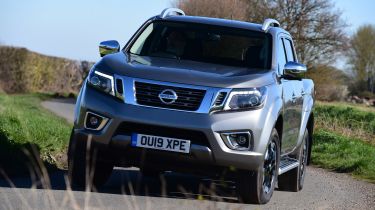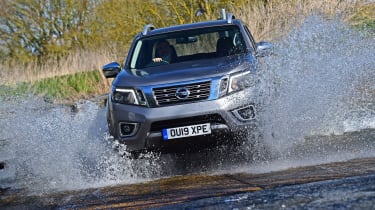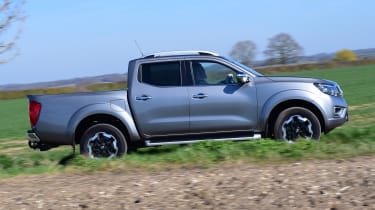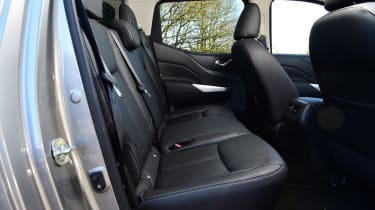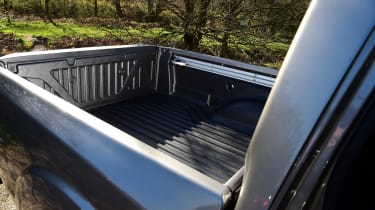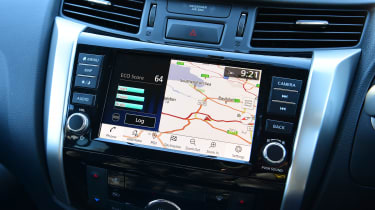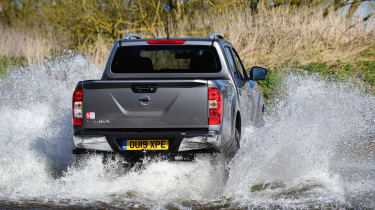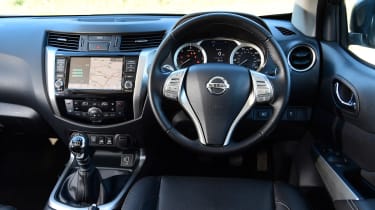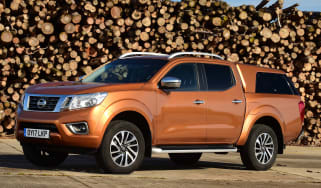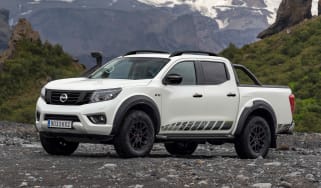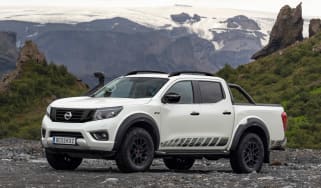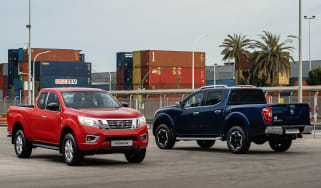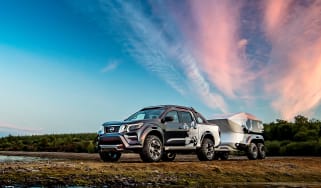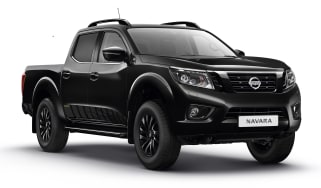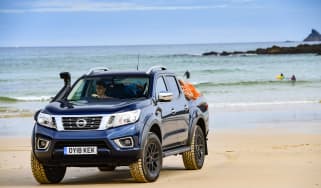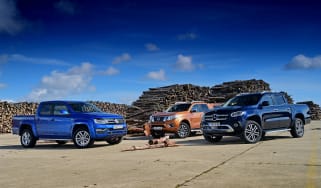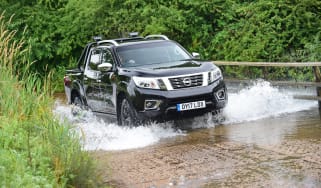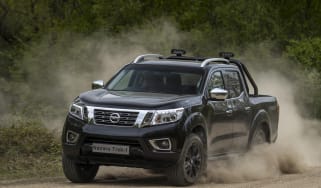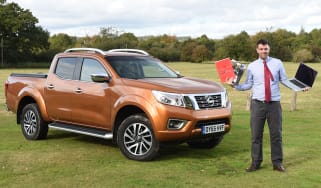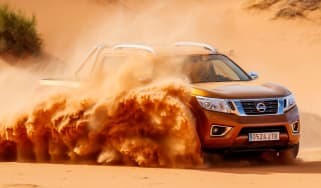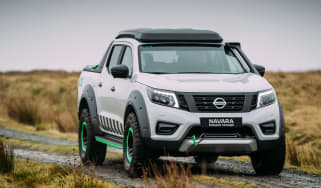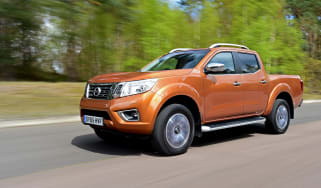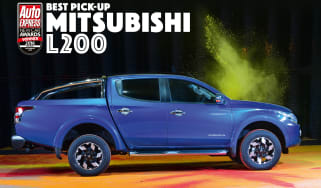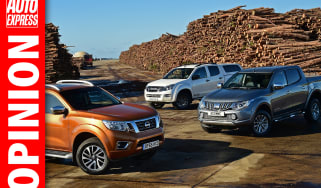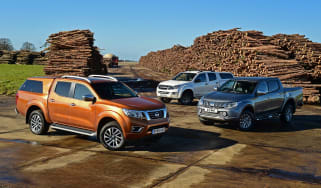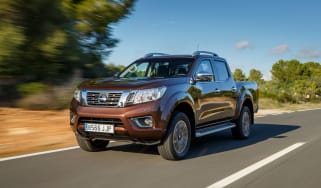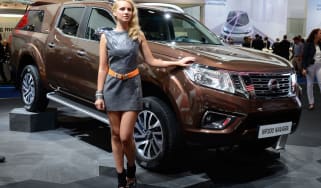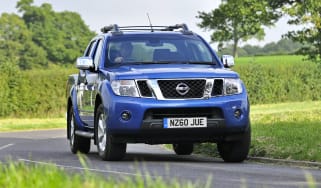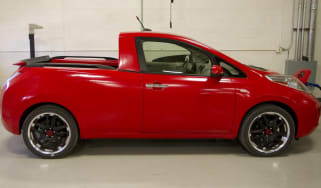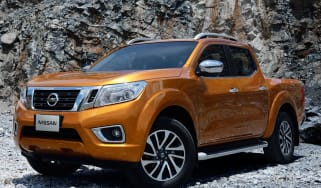Nissan Navara (2016 to 2022) pick-up review
The Nissan Navara is a well equipped one-tonne pick-up that offers decent value
The Nissan Navara is one of the better value pick-up trucks for sale in the UK. The current model arrived in 2014, and was given an update in 2019. It's a one-tonne pick-up, meaning it can carry a payload in excess of this amount, and which means it qualifies for a favourable tax rate. Makers exploit this by offering a range of high-spec models, designed for business users that need a work vehicle that can double as family transport.
The Nissan Navara is offered in King Cab and Double Cab body styles, and there are Chassis Cab variants of both with the bed removed so that conversion companies can add bespoke bodywork. The King Cab is geared more towards working life, so is only offered in more basic trims, and there are a variety of accessories available from Nissan to make the most of its working ability. Trims range from the basic Visia to the plush Tekna, while special edition models are regularly released that offer more kit and better value for buyers taking the plunge.
Every Navara in the range is powered by a 2.3 dCi diesel, with Visia and Acenta trucks getting a 163PS (161bhp) single turbo version, while N-Connecta, Tekna and N-Guard versions (as well as the special edition variants) use a 190PS (187bhp) twin-turbo diesel. The lower powered engine is the only one offered in Chassis and King Cab body styles, while the Double Cab gets both engines. Whichever power output you choose, you get a six-speed manual gearbox as standard, while the more powerful diesel is available with a six-speed auto. All versions have part-time 4WD with a low-range setting, which is selectable via a rotary dial on the dashboard.
Used - available now

2022 Skoda
Kamiq
19,856 milesManualPetrol1.0L
Cash £15,249
2023 Audi
Q5 Sportback
29,928 milesAutomaticPetrol2.0L
Cash £37,349
2021 Alfa Romeo
Stelvio
28,474 milesAutomaticDiesel2.1L
Cash £23,199
2023 MINI
Cooper Electric
25,145 milesAutomaticElectric
Cash £13,449The update in 2019 saw the shorter King Cab model and trucks with the 161bhp diesel get the same multi-link rear suspension as the 187bhp Double Cab versions. More significantly, all Navaras now get rear disc brakes instead of drums, and bigger front discs, while the rear suspension is raised by 25mm to improve the truck’s ride quality and payload weights.
• Best pick-up trucks to buy now
Rivals for the Navara are plentiful, especially as there's such a broad variety of Navara models offered. Our class favourite is the Ford Ranger, which had a thorough update in 2019 to put it at the top of the class, while the Toyota Hilux is also a strong contender that has benefitted from numerous updates. Elsewhere, the Mitsubishi L200 is a close match for kit and performance, while the Isuzu D-Max and SsangYong Musso are closer to the commercial end of the spectrum. Plush SUV-like models such as the VW Amarok and Mercedes X-Class are also available, although both will be discontinued in 2020. The latter shares its running gear with the Navara, although it has a significant price premium over the Nissan, as well as a more upmarket interior and an even more comfortable ride.
The model range comprises Visia, Acenta, N-Connecta, Tekna and N-Guard trims, while special edition models are occasionally launched by Nissan, too. Nissan also offers the AT32, a special conversion by Arctic Trucks that adds extra body cladding, an optional snorkel and 32-inch off-road tyres (hence the name). It's not quite as extreme looking as Arctic Trucks' AT35 conversions (which are available for the Isuzu D-Max and Toyota Hilux), but does give the Navara some added off-road ability.
Prices for the Navara are competitive in the class, and you get plenty of kit for your cash at the top end of the range. The 2019 update saw Nissan's latest multimedia system from the Juke added, but with rivals such as the Ranger getting more significant upgrades, the Navara is no longer the front runner in the class it once was.
MPG, CO2 and Running Costs
Navara fuel economy figures remain largely identical, whether you choose between King Cab and Double Cab body styles or go for the dCi 163 or dCi 190 engines. There's quoted economy of 40.4mpg and 184g/km of CO2 for the manual gearbox version of both, while adding the 7-speed auto to the dCi 190 engine sees these figures blunted at 38.2mpg and 194g/km. However, tax rates for pick-ups aren't based on emissions, so the CO2 figures are moot in this case.
Elsewhere, Nissan has paid particular attention to keeping costs low. All Navara models get the excellent 5-year/100,000-mile warranty that applies right across the brand's commercial vehicle range and is fully transferable to the next owner. There’s also a generous level of safety kit, including Nissan’s autonomous emergency braking technology that helps lower insurance premiums. Even better is the fact Nissan added four-wheel disc brakes with the 2019 update, boosting the truck's stopping power.
An attractive feature of the Navara is the optional hard-top for the pick-up bed. You may think it's designed with form ahead of function - it has a pretty low roofline for starters - but it's great from a security point of view with remote locking that's hooked up to the central locking system. The only downside is that the dark tinted windows combine with the tinted glass on higher spec models to make the view out the back restricted - especially as there's no wash/wipe on the rear screen.
You can also secure the load bay with a (pricey) aluminium tonneau cover, and there's a lockable plastic toolbox option, although be warned that while these add-ons boost security, they are still exposed to the elements, and aren't necessarily water-tight, so don't go thinking they can be used like a boot in a conventional car or SUV.
Trim levels from Acenta up feature Nissan's Intelligent Key system, while all models feature a Nissan approved alarm, anti-theft immobiliser, central locking, locking wheel nuts and a spare wheel lock.
Load Space and Practicality
The choice between the Double Cab and King Cab models comes down to the kind of usage buyers have in store for their Navara. The King Cab is purely a working vehicle offered in lower specifications, but it’s around £1,000 cheaper.
By choosing the King Cab you gain a little bit of load length with 1,750mm on offer compared to 1,537mm in the Double Cab, but you lose the ability to carry adults in the back in anything approaching comfort. The neat half-size rear suicide doors on the King Cab open to reveal two cinema-style folding seats that you can just about squeeze an adult into. It’s more likely that the space will be used as a secure area to carry tools or other items, with the seats available for emergency use.
That brings us to the Double Cab that 95% of UK buyers choose. Rear seat accommodation is surprisingly good for a pick-up with enough space for a six-foot adult to sit behind a six-foot driver in some comfort. The rear bench could take a third passenger in the middle, but shoulder space will be tight. Wherever you sit in the Navara, though, you'll find the floor is on the high side, so your knees will feel like they're high up in comparison to where your bottom is.
The payload penalty for choosing the Navara Double Cab is non-existent, with the 4x4 model rated at up to 1,180kg, although higher spec trucks with more standard kit see this figure drop marginally.
A tough plastic load bay bed is available, and the tailgate feels nice and solid, although there's no gas strut for soft opening like you'll find on some rivals. The space is 67mm longer than the previous-generation Navara's, and Nissan offers a wide range of options for buyers to tailor it to their own requirements. The C-Channel load securing system is included on higher-spec versions and brings movable tie-down points to help secure loads in the back.
Whatever can’t be accommodated in the rear of the Navara can go on a trailer, and the 3,500kg towing capacity is as good as you’ll find in the pick-up segment. This is available on all versions of the Navara.
Reliability and Safety
The tough box frame chassis and 4x4 system used on the Navara are carried over from the previous-generation model. Some of these older models suffered from chassis breakages due to rust, which resulted in the pick-up bed separating from the rails. But Nissan has isolated the models that suffered from this, and it's not something that has been reported to have happened with the current Navara. Under the bonnet, the Navara's 2.3-litre diesel has been fitted to over 300,000 Renault and Nissan vans, so should stand up to hard use.
On the safety front, even base Visia models get 7 airbags, stability control and Nissan’s FEB Forward Emergency Braking tech. This system detects impending collisions and puts the brakes on to lessen the impact or prevent one happening altogether. There are also Isofix child seat mounting points in the rear and LED daytime running lights as standard.
The selectable all-wheel-drive system with low-range mode and electronic limited-slip differential should give the Navara more than enough off-road ability for most. As we’ve said, it’s the same set-up carried over from the old Navara, but the electronic diff, Hill descent Control and Hill Start Assist have been added to beef up its capabilities.
Acenta variants and above get a parking camera. Where it’s fitted, the image from this is displayed on the dashboard’s 7-inch screen, but other versions have a small screen built into the rear view mirror. Top-spec Tekna models get the Around View Monitor system – a series of cameras that give a clear view all round the car. It’s particularly useful for off-roading, allowing you to check your proximity to obstacles without leaving the vehicle, but it should make the Navara almost impossible to scrape in the supermarket car park. It's worth noting that parking sensors aren't included, so it's always good to pay attention to the monitor at low speeds, just to make sure you're not in danger of colliding with anything.
Driving and Performance
Nissan's 5-link rear suspension is more advanced than the traditional leaf springs that some pick-up truck rivals use. It's great that it's now offered on every version of the Navara, but there's still some bounce to the Navara's ride.
Nissan makes a big deal of the Navara’s multi-link rear suspension, but this truck isn’t as far ahead of its leaf-sprung rivals as you might expect. It’s not wildly bouncy, but the revised Ranger is more refined, while the X-Class is smoother still on a similar platform, albeit with additional development costs thrown at it.
Overall, the Navara’s heavy kerbweight, soft suspension, slow steering and plentiful torque mean it’s best to take it easy. Driving like this means the Navara is perfectly pleasant, but a Ranger is even better.
Another addition for 2019 is a revised six-speed manual gearbox, which has longer ratios and a shorter shift. It’s designed to improve emissions, but also means fewer gearchanges while driving, and the box feels more positive than before. Go for the 7-speed automatic if you want a relaxing drive, though. It isn’t the most responsive of autos, taking a while to drop a gear when you put your foot down, but it’s extremely smooth and suits the plush feel of the high-end Navara models. Buyers just need to ask themselves whether this justifies the price and fuel economy penalty of choosing the auto.
The engine itself is smooth and refined, once it's warmed up. From cold, the Navara suffers from plenty of induction roar as you pull away, but it doesn't take long for the motor to quieten down. On a steady motorway cruise, wind around the big door mirrors is the prominent noise as the engine only kicks out a low, background thrum. The downside is that even the twin-turbo 187bhp unit can’t fire the weighty Navara up the road with any real vigour. Flexibility is fine, with 450Nm of torque on offer in the range-topping unit and 425Nm in the 161bhp base model, but at the top end both seem a little lacking. We'd recommend taking things at leisure in the Navara - it's not a truck that likes to be hustled, like a VW Amarok, for example.
Cab and Interior
The somewhat agricultural feel many pick-up trucks have on the road is often replicated in the cabin, but Nissan has gone to great lengths to make the Navara feel like a passenger car inside.
To a great extent, the interior fixtures and fittings from the X-Trail SUV seem to have been dropped into the Navara’s interior, and the most recent update also added Nissan Connect infotainment from the Juke to N-Connecta models and above. This adds Apple CarPlay and Android Auto smartphone connectivity, boosting the system's versatility.
Build quality is strong as you’d need it to be in a working vehicle, but the higher-spec models get some shiny trim finishes that do much to raise the tone. Some will feel there’s an over-reliance on piano black trim on the Tekna models, but Nissan has generally done a very good job. But again, all things are relative, and the Mercedes X-Class essentially strips out the Navara's cabin and puts a premium car interior in its place. In many ways the difference between the two is similar to the difference you get between an X-Trail and a Mercedes GLC, for example - and of course that also applies to their price tags.
Highlights of the Navara's cabin include the clear information display at the centre of the instrument cluster and the NissanConnect touchscreen navigation system, which is well integrated and easy to use, although the graphics aren't the crispest around.
The cabin isn’t over endowed with storage space, but that’s often the way with pick-ups. You get a deep bin between the seats, a couple of cup holders, a very small glovebox and decent-sized door pockets, but larger items will inevitably end up slung on the Double-Cab’s rear seats.
Behind the wheel, the driving position isn’t the most natural. There’s a high floor and a low seat, while the steering wheel only adjusts for rake, so it feels slightly awkward. The bulges at either side of the bonnet are a styling device that the company claims also provide reference points, making the truck easier to place on the road. However, go for a model with the 360-degree camera system and you can place the truck perfectly when parking, although audible sensors would be a nice addition.
Van dimensions
| Body style | Height | Width | Length |
| King Cab | 1,790mm | 2,075mm | 5,225mm |
| Double Cab | 1,840mm | 2,075mm | 5,300mm |
Load area dimensions
| Body style | Bed height | Width | Length | Tailgate height |
| King Cab | 810mm | 1,560mm | 1,758mm | 474mm |
| Double Cab | 815mm | 1,560mm | 1,578mm | 474mm |
